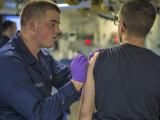Jan 28, 2003 (CIDRAP News) – The Centers for Disease Control and Prevention (CDC) says it had shipped 29,800 doses of smallpox vaccine to seven states and one county and had received requests for vaccine from another 23 states as of yesterday.
A page on the CDC Web site lists the states that have received vaccine and how many doses. It shows the agency shipped vaccine Jan 22 to Delaware (700 doses), Kentucky (200 doses), New Hampshire (3,000 doses), and South Dakota (4,300 doses). On Jan 21, the CDC shipped vaccine to Connecticut (6,400 doses), Nebraska (4,000 doses), Vermont (2,000 doses), and Los Angeles County (9,200 doses).
Officials said the Web page will be updated when states receive their vaccine shipments. The shipments are part of a program, announced by President Bush in December, to initially vaccinate an estimated 500,000 public health and healthcare workers who volunteer to serve on smallpox response teams. The plan also calls for a second stage in which up to 10 million healthcare and emergency response workers would be vaccinated. Vaccine is expected to be made available to the public in 2004.
The vaccine shipments are continuing amid calls from healthcare workers' unions and other organizations for more safeguards for those who will be vaccinated. One of the latest to speak out is the American Public Health Association (APHA), which issued a statement Jan 24 that endorsed the program but called for measures to compensate workers who suffer complications from the vaccine.
In a news release, APHA Executive Director Georges Benjamin, MD, said, "It is prudent for us to begin vaccinating the first 500,000 emergency health workers. This is an important step to further improve our public health preparedness efforts. However, civilian responders at the federal, state and local level require and should be provided the same treatment as military participants in any smallpox vaccination program."
Specifically, the APHA recommended that:
- The federal government provide adequate resources to state and local health departments, hospitals, laboratories, and other organizations involved in the immunization program, without diverting funds from other public health programs
- Liability protection be provided for organizations and individuals participating in the vaccination program
- The government establish a program to compensate workers and others who suffer complications associated with the vaccine
In addition, the APHA said it supports the Institute of Medicine's recent recommendation that the government carefully evaluate the results of the first phase of the vaccination program before moving to the second and larger phase.
The APHA also urged several other steps. These included a guarantee of nondiscrimination and privacy rights for those who choose either to participate or not to participate in the program, and ready availability of a sufficient supply of vaccinia immune globulin for treatment of vaccine complications.

















